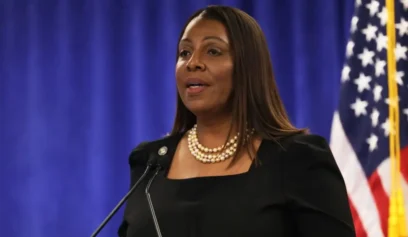
U.S. Secretary of Education John B. King, Jr. Photo by Olivier Douliery-Pool/Getty Images.
For the most part, schools across the nation have done away with spanking schoolchildren for their bad behavior. Yet, a large majority of schools, mainly in the South, still allow physical punishment or simply don’t have laws in place to explicitly ban it.
Either way, U.S. Secretary of Education John B. King Jr. wants to put an end to the harmful practice — immediately.
According to NBC News, King penned a letter to governors nationwide Tuesday urging them to abolish paddling and other forms of physical punishment from America’s classrooms. In his letter, he referred to corporal punishment as an outdated disciplinary tactic “that educators, civil rights advocates, medical professionals and researchers agree is harmful to students and which the data show us unequivocally disproportionately impacts students of color and students with disabilities.”
Federal data showed that more than 163,000 students were subjected to paddling, spanking and slapping, among other forms of physical discipline, during the 2011-2012 school year, NBC News reported. Georgia, Alabama, Idaho, Texas, Maine, Louisiana are among the states that still allow corporal punishment in schools or don’t have laws that clearly outlaw it.
“In the 21st century, there is no excuse for caning or paddling children. Just none,” Randi Weingarten, president of the American Federation of Teachers, told NBC News. “When there are behavioral issues, we need to have resources in schools to back up our vision of a positive climate.”
A report released by the U.S. Department of Education’s Office for Civil Rights earlier this year revealed that nearly 19,000 Alabama public school students were paddled during the 2013-2014 school year, the majority of whom were African American, Atlanta Black Star reported.
The data showed that while Black boys made up just 24 percent of the population at Alabama schools that allow corporal punishment, they accounted for 35 percent of all male students paddled. Black boys also comprised 38 percent of students physically punished nationwide.
Rates of corporal punishment among Black girls weren’t much better. The DOE’s report showed that African-American girls made up a quarter of the female population at Alabama schools that paddled, however, nearly half the girls who were paddled were Black.
A similar study released by the Brookings Institution also found that Black students across the South were twice as likely to be physically punished as their white peers, a trend that Fatima Goss Graves of the National Women’s Law Center said needs to be stopped.
“Students of color and students with disabilities disproportionately experience all forms of discipline,” Graves said. “That is the case when you’re talking about discipline that takes the form of out-of-school suspension or this especially severe form.”
She went on to note that not only is the physical punishment of Black students often racially motivated, but that it also negatively impacts students’ learning abilities, emotional well-being and desire to stay in school.
“Rather than supporting and helping students who may or may not be having challenges in school, it does the opposite,” Graves said.
There’s currently no federal law that prohibits corporal punishment in schools, but a 1977 Supreme Court ruling determined that physical punishment, as long as it isn’t excessive, is indeed constitutional. But King doesn’t see that as any good reason to continue to allow it in classrooms.
“Notably, the very acts of corporal punishment that are permissible when applied to children in schools under some state laws would be prohibited as criminal assault and battery when applied to adults in the community in those very same states,” he said.
A wide range of groups, including parent organizations, teachers unions, medical and mental health organizations and civil rights advocates, are backing the education secretary’s opposition to physical punishment, The Washington Post reported.
It’s hoped that state governments will soon heed the call to end corporal punishment for the sake of all students.


